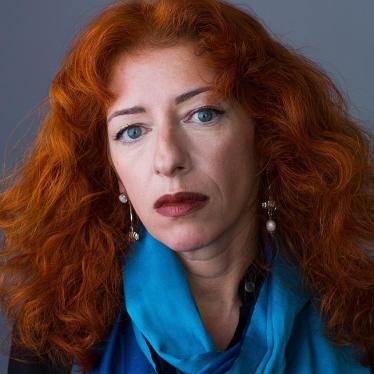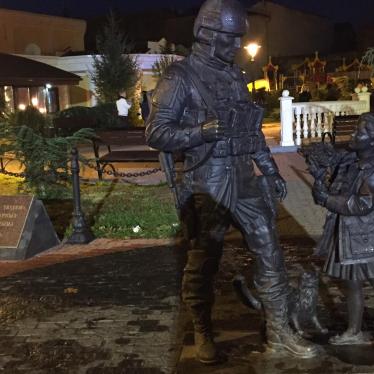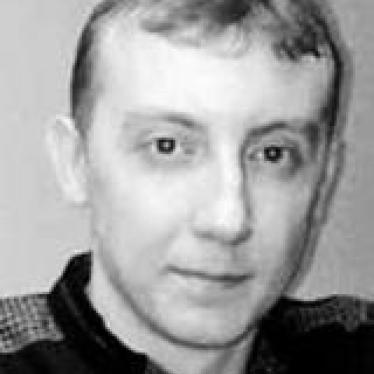This past weekend, a group of Russian ultra-nationalists threatened a documentary filmmaker at a Moscow film festival, disrupting the screening of her film, Flight of a Bullet, about the armed conflict in eastern Ukraine.
Shot in August 2014, the film chronicles Ukraine’s volunteer military battalion, Aidar, which fought against Russia-backed separatists. Members of Aidar were reportedly responsible for arbitrary detentions, enforced disappearances, and acts of torture during the war. The film doesn’t hide this: it includes footage of Aidar fighters physically and verbally abusing a civilian they suspected of supporting the separatists.
The screenings were scheduled for December 9 and 10 as part of Artdocfest, a prominent documentary film festival in Moscow. The director, Beata Bubenec, told me that during the December 9 screening, three people approached her and the festival director, Vitaly Mansky, protesting that Aidar fighters had killed and abused pro-Russian civilians and screening a film about them in Russia was inappropriate. They warned a second screening would cause “serious problems.” Bubenec said that the men threatened her, so Mansky asked her not to attend the next day.
On December 10, when the screening began, several people jumped on the stage, screaming the film was “fascist.” Others, some in camouflage, sprayed pungent gas around the room. One person there told me that audience members were tearing up and covering their noses and mouths with scarves and handkerchiefs to protect against the powerful smell. Fearing that the gas could cause respiratory problems, the organizers stopped the screening and ordered an evacuation.
There were over 50 assailants. The police arrived and led them out of the room, but released most of them in the cinema’s hallway and outside. As a well-known film critic noted, “[police officers] look calmly at the camouflaged men wreaking havoc.” According to media reports, police eventually detained several particularly aggressive protesters and released them promptly after issuing administrative charge sheets for disobeying police.
The assailants were mainly from the Russian Liberation Movement South East Radical Bloc (SERB), a small ultra-nationalist group that emerged in 2014 in Ukraine and attempted to take over Kharkiv city’s administration. To avoid prosecution, some members fled to Russia, where they have attacked several Russian pro-democracy activists and opposition figures, including leading opposition politician Alexei Navalny and his campaigners. The authorities consistently fail to hold anyone accountable, so it is no surprise that SERB and other radical pseudo-patriotic groups continue these attacks.
Mansky said that the organizers filed a police complaint, and that many audience members expressed their intention to do the same. This brazen attack clearly requires a prompt and effective investigation, and violent ultra-nationalists should be sent a strong message that they do not enjoy impunity.










